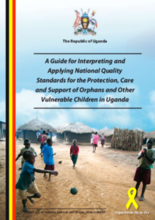The Government of Uganda (GoU) through the Ministry of Gender, Labour and Social Development (MGLSD) approved a National Orphans and other Vulnerable Children Policy (NOP) and a National Strategic Programme Plan of Interventions for Orphans and Other Vulnerable Children (NSPPI) in 2004. These two instruments reflect a commitment to and a context for the fulfillment of the rights of Ugandan children who are orphaned and/or vulnerable.
Service providers, programme implementers and communities supporting orphans and other vulnerable children (OVC) have requested guidance in order to operate within the parameters of the NOP and NSPPI. In response to this call, during 2006, the Ministry initiated the process of developing two OVC quality standards tools – the national quality standards framework and the companion OVC quality standards guide – under the leadership of a Quality Standards Task Force (QSTF) and a smaller Quality Standards Working Group (QSWG).
The purpose of the quality standards tools, namely the framework of national standards and the OVC quality standards guide, is to provide a structure and methodology for the development and application of relevant standards for the comprehensive, integrated protection, care and support of OVC at all levels. The tools are designed to be used together and in conjunction with the NOP and NSPPI, as well as with other current and future OVC-related policy and planning instruments. They can be used to:
-
Support advocacy efforts for enhanced dialogue and action for OVC;
-
Inform policy development and planning;
-
Assist in identifying service requirements;
-
Articulate consistent and quality protection, care and support;
-
Strengthen and standardize assessments of existing protection, care and support services;
-
Facilitate staff, community and caregiver development by promoting discussion and learning and in the identification of training needs;
-
Minimize negative outcomes for OVC through the correct and consistent application
of standards; -
Enhance the participation of OVC and other beneficiaries;
-
Facilitate co-ordination, strategic partnerships and collaboration across sectors;
-
Serve as a basis for accountability, auditing and management; and
-
Monitor and evaluate (M&E) programmes and services.
The framework of national quality standards and the companion OVC quality standards guide will be used by officials within Government at all levels who have responsibility for policies and programmes that benefit OVC. Service providers and programme implementers involved in the protection, care and support of OVC will also use these tools. Importantly, the tools will also be used by beneficiaries themselves – the children or adults receiving services or support. Finally, the tools can be used by donors to identify priority areas for assistance and by those providing technical assistance to OVC programmes.
©Uganda Ministry of Gender, Labour and Social Development

